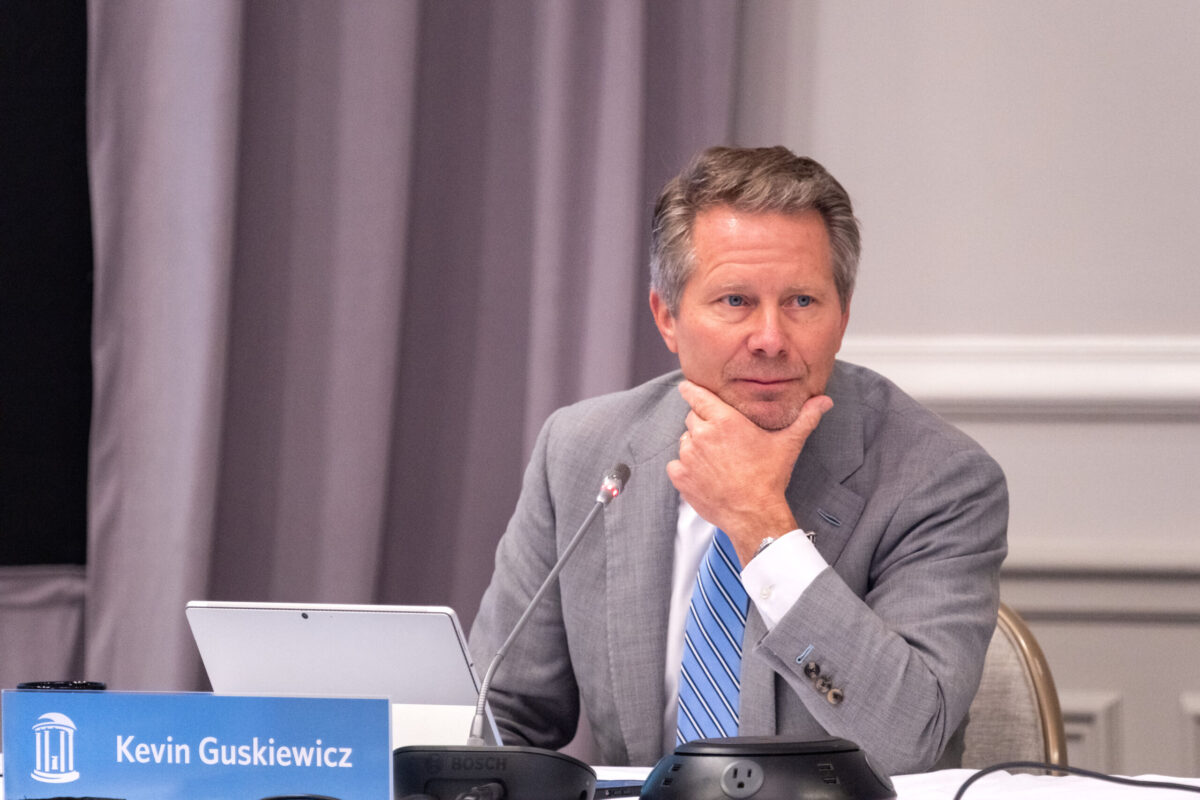Trustees, Administrators Assure Continued Funding of Humanities
Posted on Nov. 10, 2023As part of the state budget that became law in October, the North Carolina Legislature restricted funding for distinguished professorships to only STEM fields at all 16 UNC System institutions, excluding positions in the humanities, which lawmakers had funded in the past.
UNC faculty members are concerned the change will impact their research and reduce education at Carolina in the humanities, including the social sciences. But this week, members of the UNC Board of Trustees and campus administrators vowed to continue supporting distinguished professorships across all disciplines, particularly in the humanities.
The budget defines “STEM subject area” as any field of scholarship related to science, technology, engineering or mathematics. It excludes law and journalism, among other disciplines. Lawmakers gave no specific reason for changing the funding.
The professorships are funded by the state’s Distinguished Professors Endowment Trust Fund, created in 1985. The state matches private funds one-to-one for endowed professorships at UNC System’s smaller institutions and provides a third of the funding at seven larger schools, such as UNC. The fund has provided state universities nearly $226 million since 1985 to match private donations to create more than 700 professorships.

At the Board of Trustees meeting on Wednesday, UNC Chancellor Kevin Guskiewicz said he was grateful for the longstanding support for distinguished professorships from private donors and the legislature but acknowledged being disappointed by lawmakers’ recent change to the program. (Photo: UNC/Jon Gardiner ’98)
At the Board of Trustees meeting on Wednesday, UNC Chancellor Kevin Guskiewicz said he was grateful for the longstanding support for distinguished professorships from private donors and the legislature but acknowledged being disappointed by lawmakers’ recent change to the program. He said the University has a variety of sources to fund professorships in the humanities and other disciplines. “Recent changes in state funding won’t diminish the value of distinguished professorships at UNC Chapel Hill or our commitment to continue raising private funding to support distinguished professorships across all disciplines here at Carolina,” he said.
Guskiewicz told the Review he is not worried the restrictions will negatively impact Carolina’s ability to attract top-notch faculty members in the humanities and these disciplines are core to a Carolina education. “It’s what best prepares students to go out and solve the grand challenges of our time, and that means that they get an education here at Carolina that provides educational opportunities — curricula in the humanities, the arts, the natural sciences, the social sciences and more — to be well-rounded,” he said. “We will stay committed to that, and I’m confident that we’re going to be fine.”
Trustee Perrin Jones ’94 said during the Nov. 8 board meeting that the humanities are the heart and soul of Carolina. He said he’s been talking regularly with Chair of the Faculty Beth Moracco, who said professors “remain concerned about the exclusion of non-STEM fields, especially in humanities and social sciences.”
Jones said he considers the legislators’ action an opportunity for the Carolina community to rally around the humanities. He also said he thinks some “soul searching” needs to take place among humanities faculty members. “One has to ask why society at large has chosen to not value their contribution as much now as they have in the past,” he said. “To me that says either society has changed or something else has changed, but there’s been some kind of change and we need to evaluate where that occurred, what is causing that disconnect. If we can identify that, it gives us an opportunity to go back and re-instill the importance of the humanities, not only on our campus but in society.”
James White, dean of the College of Arts and Sciences, said the humanities are essential to Carolina. “I think that a liberal arts approach to education — which includes the STEM fields, it includes the arts and humanities, it includes the social sciences — I think that yields the best education,” he said. “It yields the most well-rounded students. It yields STEM students who understand how the kind of technology that they help create fits in with us as human beings. We’ve seen too many examples of how technologies, as brilliant as it is, has gotten out in front of our ability to handle that technology. There are so many examples. I’ll just use the latest one: AI.”
White said he supports promoting the STEM fields but “if we do not embrace the human side, then we lose out on how these brilliant technological advancements fit in economically, fit in socially, fit in politically, fit in ethically. The best way to have effective technological advancements is to use that liberal arts broad approach.”
The Board of Governors is expected to consider how to conform to the funding change for the distinguished professorship program at its Nov. 16 meeting.
— Laurie D. Willis ’86
